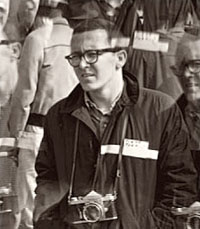Spider Martin
| James "Spider" Martin | |
|---|---|
 |
|
| Born |
April 1, 1939 Fairfield, Alabama |
| Died | April 8, 2003 (aged 64) Blount Springs, Alabama |
| Nationality | American |
| Occupation | Photographer |
| Known for | Two Minute Warning |
James "Spider" Martin (April 1, 1939 – April 8, 2003) was an American photographer known for his work documenting the American Civil Rights Movement in 1965, specifically Bloody Sunday and other incidents from the Selma to Montgomery marches.
Martin was born in Fairfield, Alabama. He was slightly built at 5 feet 2 inches (1.57 m) tall and 125 pounds (57 kg), and though he would climb trees and church towers to get a different angle for his photographs, his nickname "Spider" dates back to his school days at Hueytown High, where a reporter described him as moving "like a spider" during one of his touchdown runs on the football field.
Whilst working as a photographer for The Birmingham News he was assigned to cover the death of Jimmie Lee Jackson in February 1965; one month later, he created a notable photograph of the civil rights era, entitled Two Minute Warning, during the 1965 Selma Voting Rights Movement. His photograph showed Alabama state troopers about to attack the first peaceful Selma to Montgomery march with batons and tear gas just after it had crossed the Edmund Pettus Bridge from Selma into Dallas County on 7 March 1965.Hosea Williams and John Lewis were leading the planned 54-mile (87 km) march to the Alabama State Capitol in protest at unfair treatment of African Americans and discriminatory voting rights practices. The incident, known as Bloody Sunday, the media coverage of it and the national outcry that ensued, were influential in the course of civil rights in the U.S. Speaking about the effect of photography on the Civil Rights Movement, Martin Luther King, Jr. said, "Spider, we could have marched, we could have protested forever, but if it weren't for guys like you, it would have been for nothing. The whole world saw your pictures. That's why the Voting Rights Act was passed."
...
Wikipedia
